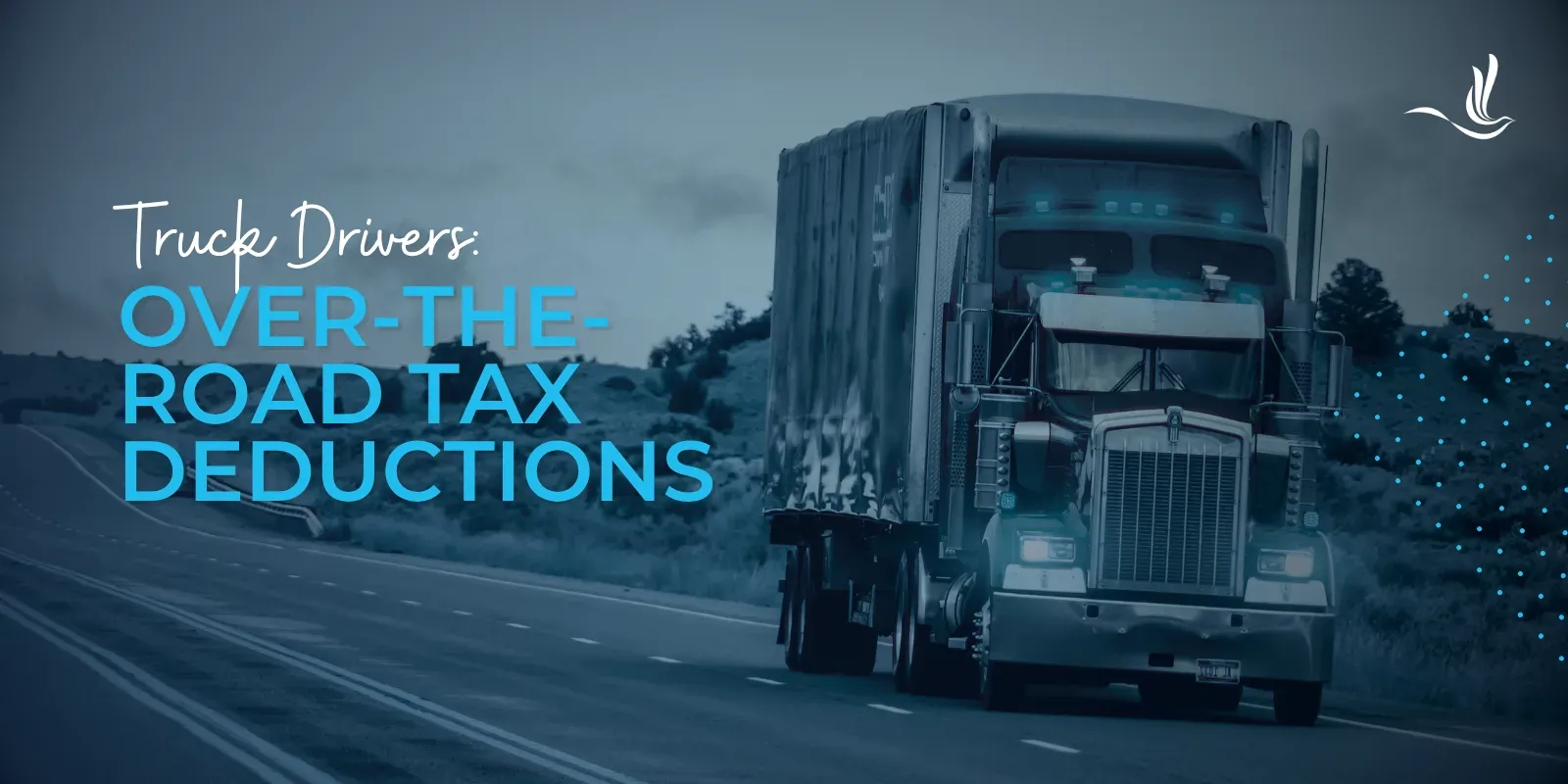Key Takeaways:
- Owner-operators can deduct a wide range of business expenses, including fuel, maintenance, insurance, depreciation, and per diem meals. You’d do this directly on Schedule C to lower taxable income.
- Company drivers generally can’t deduct unreimbursed expenses federally due to the TCJA, but some states still allow them, and employer per diem programs can reduce taxable wages.
- The IRS requires actual expense tracking for semi-trucks rather than the standard mileage rate, making detailed record-keeping essential for vehicle-related deductions.
- Eligible deductions cover travel, equipment, licenses, technology, insurance, and training, but personal or commuting costs do not qualify.
- Accurate records and receipts are crucial. Digital tools, daily logs, and documented trip purposes can help defend deductions in case of an audit.
- State-level tax rules may offer additional benefits, so check your state’s laws or consult a tax professional experienced in trucking.
Life on the road isn’t just demanding. It can be expensive.
Between fuel, meals, lodging, maintenance, and regulatory fees, truck drivers often face significant business costs just to keep moving. The good news is that many of these expenses can be deducted from your taxable income, reducing the amount you owe the IRS. This guide covers the most common tax deductions for truck drivers, whether you’re an owner-operator or a company driver. We’ll walk through IRS rules, eligible expenses, what doesn’t qualify, and strategies to make sure you’re not leaving money on the table.
Who Can Claim These Deductions
Not every truck driver qualifies for the same deductions, so it’s important to know whether your work status allows you to take advantage of them.
Owner-Operators / Independent Contractors (1099 Drivers)
If you’re self-employed, the IRS views you as running your own business.
That means you file your taxes using Schedule C (Profit or Loss from Business), and your trucking-related expenses can be deducted to reduce your taxable income.
For example, if you earned $120,000 as a long-haul owner-operator and spent $45,000 on fuel, maintenance, and other business costs, you’d only be taxed on $75,000 (before factoring in other deductions). The catch is that you must keep detailed records and only deduct expenses that are ordinary (common in the trucking industry) and necessary (directly related to earning your income).
Company Drivers (W-2 Employees)
Since the Tax Cuts and Jobs Act (TCJA) took effect in 2018, most W-2 employees can no longer deduct unreimbursed job expenses on their federal returns. That means if you’re a company driver and your employer doesn’t reimburse you for meals or tools, you generally can’t deduct them federally. There are two exceptions worth noting:
- State tax rules: Some states still allow these deductions, even if the federal return does not.
- Employer per diem programs: If your company offers a per diem allowance for meals and incidental expenses, it can reduce your taxable income.
IRS Rules on Vehicle Expenses
Truck drivers must follow specific IRS guidelines for deducting vehicle-related costs, which often differ from rules for standard passenger cars.
The IRS treats heavy vehicles like semi-trucks as qualified non-personal use vehicles. This classification means you cannot use the standard mileage rate (currently 70 cents per mile for 2025). Instead, you must use the actual expense method, tracking all costs related to operating your truck.
Common deductible vehicle expenses include:
- Fuel: Diesel, DEF fluid, and even additives count.
- Maintenance & Repairs: Oil changes, tire replacements, brake work, and other upkeep.
- Insurance: Liability, cargo, and physical damage coverage.
- Depreciation: The cost of your truck is deducted over time, based on IRS schedules.
- Washing & Detailing: Keeping your truck clean for business purposes.
- Registration Fees & Permits: Annual state fees and permits tied to operating your vehicle.
Let’s look at an example. Say you purchased a new semi-truck for $150,000.
You could depreciate it over three years for regular tax purposes (or four years for Alternative Minimum Tax rules). A $20,000 trailer purchase would typically depreciate over five years.
Common Deductible Expenses
From meals on the road to safety equipment, there are numerous expense categories that can lower a truck driver’s taxable income.
Travel & Per Diem
Over-the-road truck drivers often qualify for travel-related deductions because their work requires them to be away from their tax home for more than a standard workday.
Key deductible items include:
- Lodging: Hotel, motel, or rental stays while on dispatch.
- Meals: Deductible using either the actual cost or the IRS per diem rate for transportation workers.
- Laundry: Washing clothes while away from home.
- Parking & Tolls: Fees incurred during work trips.
Truck divers should also keep the “Away from Home” Rule in mind. It says you must be away long enough to require sleep or rest before returning home. Driving eight hours and returning the same night doesn’t qualify.
Equipment, Tools & Supplies
These deductions cover gear that helps you perform your job safely and efficiently.
Examples include:
- Load Straps, Chains, and Tarps – Used to secure cargo.
- Safety Gear – Hard hats, gloves, reflective vests, steel-toed boots.
- Logbooks or ELD Devices – Paper or electronic tracking tools.
- Office Supplies – Pens, notepads, clipboards for paperwork.
- Subscriptions – Industry magazines or GPS services.
If an item has mixed personal and business use (like a tablet), you can only deduct the percentage used for work.
Licenses, Fees & Taxes
Truck drivers face numerous mandatory fees, and many are deductible as part of doing business.
- International Registration Plan (IRP) Fees
- International Fuel Tax Agreement (IFTA) Fees
- Heavy Vehicle Use Tax (Form 2290)
For example, if your HVUT payment for the year is $550 and your CDL renewal is $75, both amounts can be deducted in full.
Communication & Tech
Modern trucking depends on staying connected, and technology-related costs can often be written off.
- Cell Phone & Service Plan – Deduct the portion used for business.
- Laptop or Tablet – For logging hours, communicating with dispatch, or tracking expenses.
- Internet Service – Including mobile hotspots.
For instance, if your monthly cell bill is $120 and you use it 80% for work, you can deduct $96 per month.
Insurance & Medical Exams
Certain insurance premiums and industry-required medical costs are also deductible for truck drivers.
- Liability, Cargo, and Physical Damage Insurance
- Business Interruption Insurance
- DOT-Mandated Medical Exams
Personal health insurance premiums may be deductible separately if you’re self-employed and meet certain criteria.
Training & Education
Continuing education can improve your skills and keep you compliant with industry requirements.
- CDL Training or Refresher Courses
However, courses that qualify you for a new trade or business (like moving from trucking into accounting) are not deductible.
What’s Not Deductible
Knowing what you can’t deduct is just as important as knowing what you can, especially to avoid IRS issues. Even though life on the road blurs the line between personal and business expenses, the IRS has clear boundaries:
- Personal Expenses – Souvenirs, movies, or sightseeing while on a route.
- Commuting Costs – Driving from your home to your first dispatch location.
- Clothing – Everyday wear like jeans or t-shirts, even if only worn while driving.
- Personal Hygiene Products – Shampoo, toothpaste, razors, unless part of a DOT-mandated kit.
For example, if you pick up snacks at a truck stop for personal consumption, that’s not deductible unless they qualify as a meal during a deductible travel period.
Record-Keeping Best Practices
Meticulous record-keeping ensures your deductions are valid and defensible if the IRS audits your return. Good documentation is the backbone of claiming tax deductions for truck drivers. The IRS requires you to keep receipts and records proving each expense was business-related.
Best practices include:
- Save Receipts: Paper or digital copies are acceptable.
- Logbook Details: Keep records of dates, locations, and purpose of trips.
Tax Filing Implications
Your tax filing requirements and opportunities for deductions depend on whether you’re self-employed or an employee.
If you’re self-employed, you’ll file:
- Schedule C – Reports income and expenses from your trucking business.
- Schedule SE – Calculates self-employment tax.
- You may also qualify for the Qualified Business Income (QBI) Deduction, allowing you to deduct up to 20% of your net business income.
If you are a heavy vehicle operator and your truck has a taxable gross weight of 55,000 pounds or more, you must file Form 2290 and pay the Heavy Vehicle Use Tax.
This tax is deductible as a business expense.
State-Level Considerations
State tax laws can vary widely, and in some cases, they offer deductions not available at the federal level. While federal tax law restricts W-2 employees from deducting job expenses, some states, like California and New York, still allow them on state returns. This can be a valuable break for company drivers who have unreimbursed expenses. Always check your state’s Department of Revenue or consult a tax professional familiar with trucking in your area.
Tips & Practical Guidance
Strategic planning can help you get the most out of your deductions and reduce your overall tax burden.
- Compare Per Diem vs.
Actual Costs:
Use whichever method results in a higher deduction for meals.
- Maximize Depreciation: Consider Section 179 expensing or bonus depreciation if purchasing a new truck.
- Negotiate Employer Per Diem: If you’re a company driver, this can reduce taxable income without affecting your paycheck.
- Stay Organized Year-Round: Don’t wait until tax season to sort receipts and records.
Tax Help for Truck Drivers
Whether you’re driving coast-to-coast as an owner-operator or hauling locally as a company driver, understanding and claiming the right tax deductions for truck drivers can significantly reduce your tax bill. The key is knowing what qualifies, keeping meticulous records, and planning ahead. When in doubt, work with a tax professional who has experience in the trucking industry. Optima Tax Relief is the nation’s leading tax resolution firm with over a decade of experience helping taxpayers.
If You Need Tax Help, Contact Us Today for a Free Consultation
Disclaimer: This story is auto-aggregated by a computer program and has not been created or edited by finopulse.
Publisher: Source link








